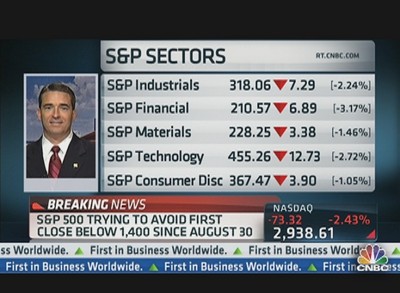11.8.12
CNBC
Stocks took a sharp nosedive in a post-election selloff Wednesday, with the Dow logging its biggest decline in nearly a year, prompted by concerns over the looming "fiscal cliff" and amid renewed worries over Europe's weak economy.
The Dow closed below 13,000 for the first time since early August, while the S&P 500 broke below 1,400.
“It’s now how quickly we can focus on the ‘fiscal cliff’ and coming up with a resolution—that's certainly the next item on the agenda for the market,” said Art Hogan, managing director of Lazard Capital Markets. "And you still have Europe."
The Dow Jones Industrial Average plummeted 312.95 points, or 2.36 percent, to close at 12,932.73, logging its biggest one-day drop in almost a year. Bank of America [BAC 9.23 -0.71 (-7.14%) ] and JPMorgan [JPM 40.48 -2.40 (-5.6%) ] were the biggest blue-chip laggards.
The S&P 500 tumbled 33.86 points, or 2.37 percent, to finish at 1,394.53. The Nasdaq slumped 74.64 points, or 2.48 percent, to end at 2,937.29.
The CBOE Volatility Index, widely considered the best gauge of fear in the market, jumped near 19.
All key S&P sectors ended firmly in the red, led by energy and financials.
Apple [AAPL 558.0019 -22.1976 (-3.83%) ] fell more than 3 percent, pushing the tech giant down a jaw-dropping 20 percent from its all-time high of $705.07 in mid-September. The stock finished the session in bear market territory.
Obama was re-elected president Tuesday night, put over the top by the crucial battleground state of Ohio following the most expensive election in U.S. history.
Meanwhile, ratings agency Fitch said Obama needs to move quickly to avoid the "fiscal cliff," adding that failure to address the issue would likely result in a downgrade in 2013. Moody's said it would make a decision following the budget negotiations, though going over the "fiscal cliff" would not immediately trigger a downgrade.
Wall Street had favored Romney and the Republican ticket in part because it preferred their approach of retaining tax cuts, and making spending cuts. The Obama Administration favors raising taxes on the richest Americans, and also increasing capital gains and dividend taxes. (Read More: Fixing 'Fiscal Cliff' Will Mean 'High, Higher' Taxes)
Across the pond, European shares reversed their gains to close sharply lower following ECB President Mario Draghi's negative comments on the region's economy. Draghi said economic activity in the euro zone area is expected to remain weak and the slowdown may have reached Germany.
And the members of Greece’s parliament are expected to vote on a new package of austerity measures with the government’s majority under threat. If the bill doesn’t pass, Greece will not receive its next financial aid installment of 31.5 billion euros ($40.2 billion) on Monday.
“The U.S. election temporarily flipped worries over Europe, but Europe still has an important role in global markets,” said Quincy Krosby, market strategist at Prudential Financial. “They’ve obviously been a chronic condition, but it’s flare ups like today that grab attention.”
Among earnings, Macy's [M 40.45 -0.93 (-2.25%) ] reported a higher profit, thanks to sales gains, and the department-store chain also boosted its full-year earnings guidance.
Kraft Foods [KRFT 44.57 -0.13 (-0.29%) ] ended slightly lower even after the newly independent food manufacturer reported a higher profit and affirmed its 2013 outlook.
Bucking the trend, Time Warner [TWX 44.91 1.80 (+4.18%) ] rallied after the media company posted better-than-expected earnings.
Qualcomm [QCOM 58.1213 -2.2487 (-3.72%) ], CBS [CBS 34.00 -0.43 (-1.25%) ] and Activision Blizzard [ATVI 11.13 -0.21 (-1.85%) ] are among companies slated to post earnings after the closing bell.
Treasury prices slipped from session highs after the government auctioned $24 billion in 10-year notes at a high yield of 1.675 percent. Bid-to-cover was 2.59.
On the economic front, weekly mortgage applications declined last week as Hurricane Sandy battered the East Coast and disrupted normal business activity, according to the Mortgage Bankers Association.
And consumer borrowing expanded by $11.36 billion in September, according to a Federal Reserve report. Economists polled by Thomson Reuters expected a gain of $10.1 billion.
—By CNBC’s JeeYeon Park (Follow JeeYeon on Twitter: @JeeYeonParkCNBC)

No comments:
Post a Comment